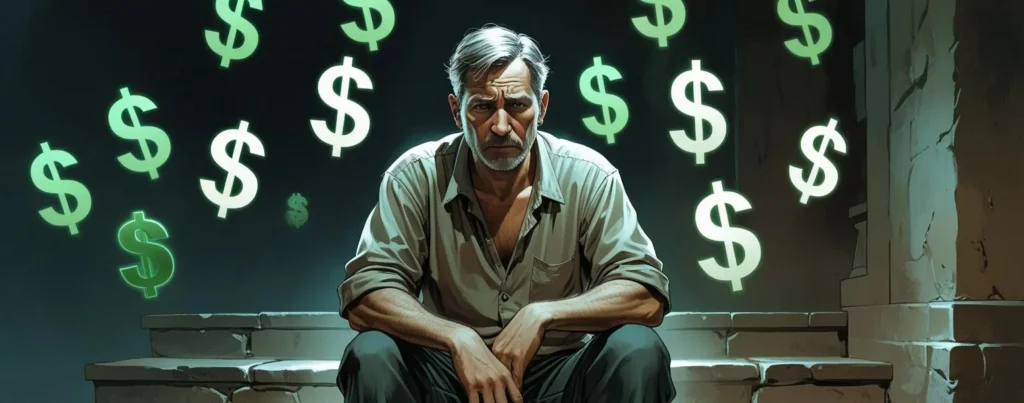The REAL Reason You’re In Debt

The REAL Reason You're In Debt
If you’re struggling with debt, you’ve probably tried every budgeting trick, app or spreadsheet out there. You know you should spend less than you earn, avoid unnecessary purchases, and save more. Yet, you’re still stuck. The real reason you’re in debt might have little to do with money and everything to do with something deeper. In this post, Sam Kwak, one half of the Kwak Brothers and a certified credit counselor and financial education instructor, shares a surprising perspective on why debt persists—and how to break free.
It’s Not About Money—It’s About Emotions
As humans, we’re wired to do two things: avoid threats and pain (like losing a job or becoming homeless) and seek survival and thrive (feeling secure and fulfilled). Our emotions, especially fear, drive many of our decisions, including how we handle money.
Have you ever found yourself scrolling through a shopping app with no intention of buying, only to feel soothed by the act? Or walked into a store, bought something on sale, and justified it with “I might need this someday”? If this sounds familiar, you might be engaging in comfort spending—a subconscious attempt to cope with stress, anxiety or boredom.
My Story: Comfort Spending as a Coping Mechanism
Years ago, I (Sam) struggled with comfort spending. When stress or anxiety hit, I’d head to a store and buy random items. The act of purchasing gave me a temporary sense of control and a hit of dopamine, the brain chemical that makes us feel rewarded. It was exciting walking out with bags of stuff, but hours later, the stress returned. The items I bought didn’t solve my problems—they just masked them temporarily, leaving me with less money for important goals like investing or saving.
The Deeper Issue: Fear and Anxiety
Comfort spending is just one way we try to manage deeper emotions like fear, anxiety, loneliness or even boredom. For some, it’s shopping; for others, it’s gambling, substance use or overworking. These behaviors offer a fleeting sense of control, but they don’t address the root cause. The result? Persistent debt, not because you lack budgeting skills or income, but because you’re using spending as a crutch.
I’ve seen this in clients, too. One client, after losing her husband and feeling isolated from her adult children, turned to spending to cope with loneliness. Advertisements made her feel seen, but the purchases led to debt. The issue wasn’t her income or lack of financial knowledge—it was an emotional void.
I’ve met millionaires who spend excessively due to stress, trauma or loneliness. Fear is a powerful emotion that drives us to act, often in ways that sabotage our financial health. In my case, the root was a fear of rejection—a belief that I wasn’t enough. This fear impacted not just my finances but my relationships, career and health.
The Solution: Address the Root Cause
No amount of financial hacks or literacy will fix a deeper emotional issue. Budgeting apps and spreadsheets treat the symptoms, not the cause. For me, the turning point came when I confronted my fear of rejection. As a Christian, I found freedom by asking God how He sees me, letting that truth reshape my perspective. This shift reduced my anxiety, making it easier to budget, plan and make better financial decisions.
You don’t need to share my faith to recognize that fear can drive poor choices. I once met someone who turned to alcohol to escape fears of rejection rooted in childhood trauma. Like comfort spending, it was a temporary fix that didn’t solve the underlying pain.
Steps to Break Free
- Recognize the Emotion: Identify the fear, anxiety or loneliness driving your spending. For me, it was rejection; for my client, it was loneliness. What’s yours?
- Give Yourself Grace: Feeling stressed or fearful is human. Don’t shame yourself—acknowledge that you’re valuable and capable of change.
- Address the Root Cause: Whether through faith, therapy or community, find ways to confront and heal from the emotions fueling your habits.
- Replace Comfort Spending: Build healthier coping mechanisms, like connecting with supportive people or pursuing meaningful activities.
There’s Hope for Freedom
The good news? You don’t have to stay trapped in debt or rely on comfort spending. By recognizing and addressing the deeper emotional drivers, you can break the cycle. My client found healing by connecting with others, which transformed her finances. For me, overcoming fear led to better decisions across all areas of life.
Financial success is 80% psychology and spirituality and only 20% tactics and strategies. You already know to budget and spend wisely, but if you’re struggling, a deeper issue might be at play. As someone with a faith background, I want to bless you with this: May the God of peace and truth reveal the lies fueling your fear and replace them with hope, freedom and redemption.
Take the First Step
If this resonates, explore our content on YouTube or Facebook for more insights on managing finances and breaking free from debt. Share your thoughts in the comments—we’d love to connect and support you on your journey to financial freedom.
Pages
Get In Touch
3809 Illinois Ave STE 100
St. Charles, IL 60174
- Email: Info@acceleratedstrategies.com
- Phone: (630) 635-5689
© 2025 All Rights Reserved

